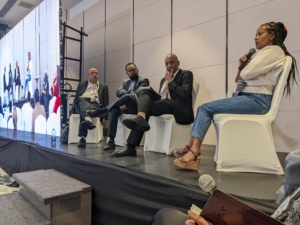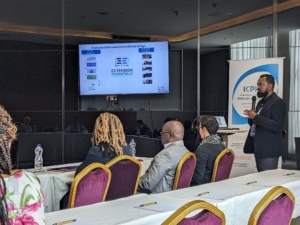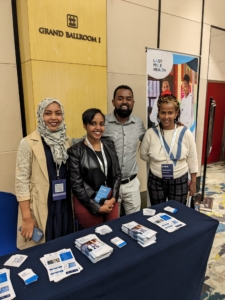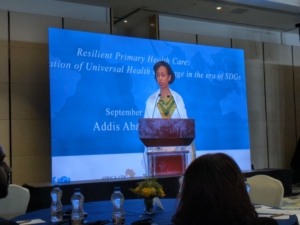From September 5 through September 7, 2023, health leaders from 50 countries convened in Addis Ababa, Ethiopia, for the International Conference on Primary Health Care (ICPHC), organized by the International Institute for Primary Care – Ethiopia in collaboration with the Ethiopia Ministry of Health and the Johns Hopkins Bloomberg School of Public Health. Last Mile Health co-sponsored the convening, which united government delegations, technical experts, advocates, and partners to advance the conversation on primary health as a driver of universal health coverage.
Since 2021, Last Mile Health and the Ministry have worked together to strengthen training for community health workers in Ethiopia’s flagship Health Extension Program. In partnership, we’ve developed, piloted, and begun to scale an innovative blended learning training (incorporating both digital and in-person elements) for the country’s 40,000+ community health workers, known nationally as health extension workers. As of June 2023, the Ministry has formally adopted the blended approach for all community health worker training, and Last Mile Health is continuing our partnership as we develop additional training modules and scale the pilot module.
At ICPHC, Last Mile Health and the Ministry of Health teamed up again, sharing lessons learned and inviting community health workers to share their vital perspectives. Together, we hosted two concurrent sessions, supported the attendance of the only two community health workers present at the event, and connected with partners to advocate for investment in community health workers and the systems that support them.
“Primary healthcare recognizes the power of community engagement,” said H.E. Dr. Lia Tadesse, Ethiopia’s Minister of Health, at the opening plenary. “It actively involves communities in decisions, leading to better health outcomes…We firmly believe communities must be decision-makers.”
Here’s what community health workers, Last Mile Health staff, and the Ministry of Health leaders shared at ICPHC.
Concurrent session: Innovations in training for community health workers

Melaku Yilma, Abraham Zerihun, Israel Ataro, and Serkalem Getachew speak on Last Mile Health and the Ministry of Health’s first concurrent session panel at ICPHC.
Last Mile Health and the Ministry of Health co-hosted a panel conversation to share lessons learned from our blended learning training module—and to underscore why governments and partners must invest in digital tools and systems to improve training for community health workers. The Ministry of Health was represented by Israel Ataro, Lead Executive for Community Engagement and Primary Healthcare, and Melaku Yilma, Health Extension Projects Specialist. Last Mile Health’s Ethiopia Country Director, Abraham Zerihun Mengentta, also joined the panel. In addition, community health worker Serkalem Getachew, who has provided care in her community in the Amhara region for 13 years, shared her perspectives on the training and its impact on her work with patients.
“The blended training is much better than previous ones. It’s accessible on our tablet. We can watch the videos again and again and perfect our skills,” said Serkalem, emphasizing the need for all community health workers to receive digital support for increased knowledge and skills—and better patient care.
Concurrent session: Setting community health workers up for success by equipping them with digital tools

Last Mile Health’s Ethiopia Country Director Abraham Zerihun presents findings at the second concurrent session.
Last Mile Health’s second session dove into data-driven, applied recommendations to optimize community health workers’ performance. Last Mile Health’s Abraham Zerihun Mengentta joined a panel of health leaders to underscore the need to equip community health workers with digital tools to enable formal training and mentoring, supportive supervision, data reporting, quality of care monitoring, and timely payment. “Let’s go beyond knowledge and measure the practical skills of community health workers,” said Abraham. “In our blended training, we monitor community health workers’ performance in their practical work to ensure they can apply the knowledge they gain.”
Following the two sessions, Last Mile Health and the Ministry of Health raised a joint call to action: “We call on governments, funders, and partners to invest in building skills of community health workers by equipping them with the digital tools that support them to learn effectively, report consistently, and provide quality care to patients in the world’s most remote communities.”
Amplifying the voices of community health workers

Last Mile Health staff members and community health worker Serkalem Getachew represent the team at ICPHC.
Despite growing awareness of the power of community health workers, they remain critically underpaid for their work—and critically underrepresented in decision-making on community health.
“There should always be at least one community health worker on every panel at every conference,” said John Wabwire Shikuku, a community health worker from Kenya whose attendance at ICPHC was supported by Africa Frontline First (an initiative in which Last Mile Health is a core member). “We must be heard! We understand the communities where we work. We understand their needs and we can serve as a voice for the community.”
Serkalem Getachew, who spoke on Last Mile Health and the Ministry of Health’s panel, underscored why conversations and decisions about community health must include community health workers. “We are the linkage to the health system for all patients in our communities,” Serkalem stated. “I am the most responsible in preventing maternal and child death in my community. I ask governments and funders to give attention for the promotion and retention of community health workers.”





